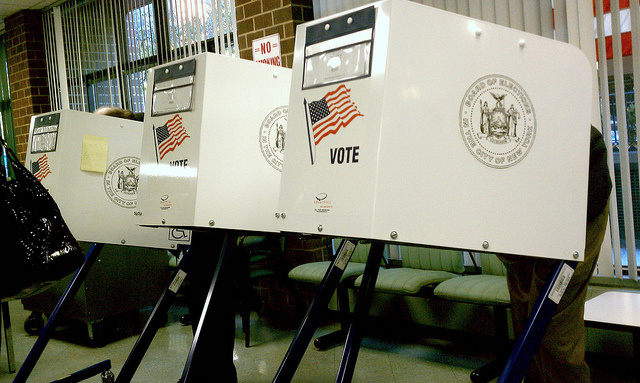Push to Elect Presidents by Popular Vote Gains Momentum
Colorado is the latest state to join an agreement to bypass the Electoral College. Carl Mikoy / Flickr Creative Commons
Carl Mikoy / Flickr Creative Commons
After Hillary Clinton’s bruising 2016 election loss, when she won the popular vote but lost the Electoral College—the second time in five election cycles this outcome has occurred—multiple advocacy groups, the editorial board of The New York Times and some state legislatures renewed calls for abolishing the Electoral College.
Now, as NBC affiliate KUSA reports, Colorado Gov. Jared Polis, a Democrat, plans to sign a bill that provides for the state’s nine electoral votes for president to go to the candidate who wins the nationwide popular vote, not to the candidate who wins the most votes in the state.
Eleven other states and Washington, D.C., have joined the National Popular Vote Interstate Compact, a joint agreement that would give these states’ votes to the national popular-vote winner. The agreement will only be enacted, however, if states collectively representing 270 electoral votes join. Under the Constitution, states can decide how to “spend” their votes, and most award them to the candidate who wins the most votes in the state.
As Deanna Paul explains in The Washington Post, most states tend to lean consistently Democrat or Republican in their votes for president, and candidates may forego focusing on issues important to those states or heavily campaigning there, thereby creating “a handful of ‘battleground states’ that candidates focus their attention and policies on.”
John Koza, chairman of National Popular Vote, a coalition advocating for state governments to join the compact, explains the problem, telling Paul, “If candidates are behind in a state, they ignore it because they won’t be able to flip it during a three-month campaign. If they’re ahead in a state, they don’t pay attention because they won’t lose it.”
So far, the compact has 172 of the 270 votes necessary for it to take effect. They are from Rhode Island, Vermont, Hawaii, Connecticut, Maryland, Massachusetts, Washington, New Jersey, New York, Illinois, California and the District of Columbia.
As Sam Brasch reports on NPR, this “Electoral College workaround is gaining momentum in the Mountain West,” where, in addition to Colorado, a popular-vote bill is under consideration in the New Mexico state Senate after winning approval in its House. If passed, Brasch writes, “It would show the plan has momentum outside of the Coastal U.S., especially in places where Democrats have full control of state government.”
Public support for the popular vote is strong, according to a Pew Charitable Trusts poll, which shows 55 percent of respondents in favor, though results vary widely by party. Seventy-five percent of Democrats support moving from the Electoral College to the popular vote; only 32 percent of Republicans support the popular vote.
Brasch notes that it’s unclear whether the compact is constitutional. Because the Electoral College is written into the Constitution, he writes, “Some insist that Congress would have to approve [a change] since it would overhaul national election procedures,” while “[o]ther scholars have argued that states can’t bind their electors to voters outside their boundaries.”
While Koza remains hopeful about the compact’s future, other experts are more cautious. Reed Hundt, chairman and co-founder of Making Every Vote Count, told the Post, “The problem with the compact is getting another dozen states to sign on,” adding, “Republican states haven’t embraced it yet.”
Your support is crucial…With an uncertain future and a new administration casting doubt on press freedoms, the danger is clear: The truth is at risk.
Now is the time to give. Your tax-deductible support allows us to dig deeper, delivering fearless investigative reporting and analysis that exposes what’s really happening — without compromise.
Stand with our courageous journalists. Donate today to protect a free press, uphold democracy and unearth untold stories.









You need to be a supporter to comment.
There are currently no responses to this article.
Be the first to respond.